Welcome to Monday. A bit late with the Roundup because I was working on naked ride stuff from yesterday. I hope you’ve got a great week planned.
Below are the most notable stories I came across in the past seven days. Thanks to everyone who suggested links this week!
Big win for housing: California’s governor has finally signed SB 79 into law, a groundbreaking policy that is expected to open up construction of housing units adjacent to major transit stops. (Human Transit)
Inhaler emissions: A new study found that asthma inhalers cause about the same amount of climate change inducing emissions each year as 500,000 cars. It’s unclear if the researchers considered that many of those inhalers are necessary because of cars. (Al Jazeera)
It’s a trend: Maybe this cultural moment of reconsidering our relationship with automobiles might actually stick? I mean, according to David Zipper there are three new books on the topic that are worth your time. (Bloomberg)
Smartphones with wheels: It’s hilarious to me that Big Auto is so excited about making cars feel like tech gadgets that now they have glitches just like tech gadgets. Case in point: A Jeep software update recently rendered many of them machines un-driveable. (The Stack)
E-bike rebates work: Denver, Colorado was the first city to launch an e-bike rebate program and in the past 3-4 years they’ve handed out a whopping 10,000 rebates. Portland’s program follows their lead and we can only hope it goes as well. (City of Denver)
Bike bus is rockin’: Portland’s Sam “Coach” Balto continues to transcend typical advocacy channels by luring massive pop stars onto the bike bus. Learn more about who he is and how he does it. (Cycling Weekly)
Potholes: Major e-bike news outlet uses a tragic case of an e-scooter rider in Portland to illustrate their argument that road conditions — not car drivers — are another major threat to rider safety. (Electrek)
Culture shift: “In cities that have made [bicycles] mainstream, the idea of going back to car-clogged streets is considered ridiculous.” The fact that this outlet wants to see a bike boom in cultural terms is both frustrating and welcome. (The Economist)
Get it right, media!: An unfortunate story from north of our border where the legit issue of electric vehicle safety is covered, but the imagery shows a bicycle that is almost never the cause of concern. This story should have made it clear that the “safety problem” is with e-motos and not traditional e-bikes you find in traditional bike shops (or in their lead image). (The Columbian)
Dieselgate back in court: Whether or not five automakers cheated on emissions tests and then lied to customers about how toxic their engines were, will be decided by a judge. The case is back in court and a decision is expected early next year. (BBC)
Thanks to everyone who sent in links this week. The Monday Roundup is a community effort, so please feel free to send us any great stories you come across.



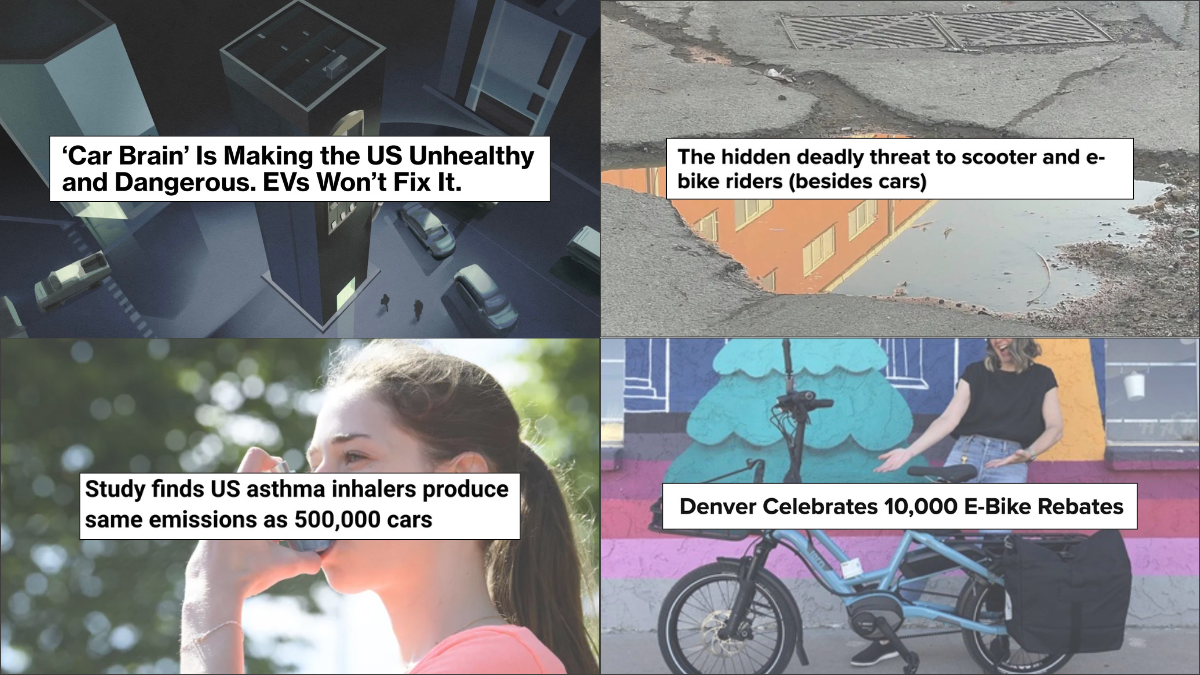
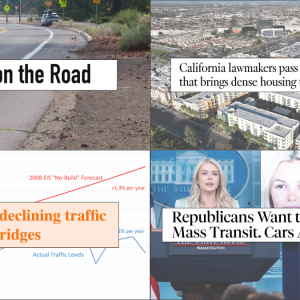
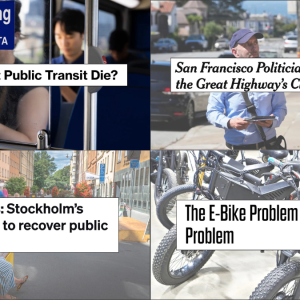
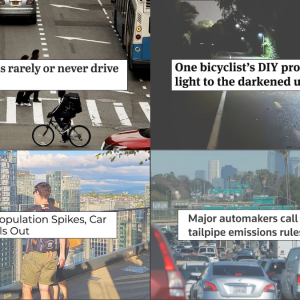
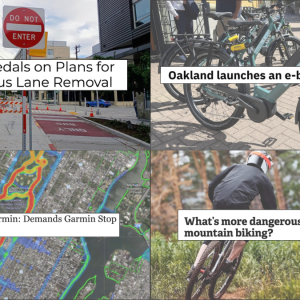
Thanks for reading.
BikePortland has served this community with independent community journalism since 2005. We rely on subscriptions from readers like you to survive. Your financial support is vital in keeping this valuable resource alive and well.
Please subscribe today to strengthen and expand our work.
I think it’s weird to cite the number of e-bike rebates claimed as evidence that the rebates “work”. To my mind, I’d say they’re working if, for instance, there were evidence that the people who claimed the rebates reduced their number of miles traveled in single-occupant cars.
More information can be learned by clicking the underlined word in parentheses. That takes you to the article Jonathan is citing, where they give more details.
Thanks; I didn’t click the link because I assumed that the number of rebates issued was the most significant detail given at the link, since that’s what Mr. Maus chose to highlight.
I do t think that’s weird.
The fact that they’ve given out that many shows 1) there’s huge demand (which validates the need for the program) and 2) it also shows their system can handle all those transactions.
There can be multiple ways to define success. Oh, and also happens to be known if you read about the program that it is actually successful on all the other more traditional metrics.
I don’t think “people readily accept free money” is the surprising fact that you seem to think it is.
A rebate on buying bags of weed would also see a ton of use. That doesn’t mean we “need” it.
Hi Matt,
I didn’t say accepting free money was a surprising fact. My point is that over three years since it started, the City of Denver is still positive about the program and they are celebrating an important operational milestone. And other reporting around this program shows that it is working well. To me, that’s a success in many respects. That’s all I’m saying.
The market barrier is the USA not giving the tiniest **** about the climate crisis.
I’m glad to see something about potholes. There’s nothing hidden about the danger there. Drivers just don’t think about them as much, because they have those big tires & those cushy shocks.
The article avoids criticism of dangerously small scooter wheels or excessive speeds that are easily available to unskilled riders which are actually serious issues.
The point is that it’s an article about potholes. No matter what you think, potholes are actually dangerous to bikes, and scooters. Your wheel size, and your speed don’t matter if the potholes are big enough.
Is a small wheel inherently dangerous? Or does a poorly maintained travel surface make it so?
The smaller the wheel, the smaller the imperfection it takes to cause you to lose control. A pebble that could send a skateboarder flying onto their collarbone would barely even be noticeable under a beach cruiser’s 26 x 2.125 tire.
Yes, fucked-up pavement is a problem. But it’s a bigger problem the smaller your wheels are. There’s no way in hell I’d try to ride those tiny scooter wheels on the asphalt of Portland today; but on my bike it’s just a minor annoyance.
That’s a good argument for maintaining the streets & sidewalks.
Seems to me that it’s both a good argument for perfecting the pavement, and for minimizing your vulnerability to imperfect pavement in the mean time.
We live in the real world, where very small wheels on fast vehicles are inherently dangerous.
You must not ride much because Portland’s pot holes, wheel-grabbing vertical cracks, and asphalt ramps (caused by buses) are increasingly common transportation cycling hazards.
On NW Flanders above I405, the pavement is crap for blocks but they took loads of asphalt up there and used it for–speed bumps. As constructed those speed bumps do not deter motor vehicle operators but the cracks, potholes etc aren’t great to ride on. Sure, the bridge is kinda nice.
Great roundup. BTW, for links that are behind a pay wall, could you provide the archive.is link instead?
Archive links on a public site like Portland would invite DMCA requests, which are a pain in the *** for a small operation. It’s pathetic that the bypass paywalls clean extension was banned from firefox, github, and gitlab.
Hi Ben. No. I won’t do that. I think folks need to consider paying for access to stories and/or putting in the work to get around the paywall themselves. As a publisher myself who relies on people paying for my work, I cannot in good conscience aid people in getting journalism for free. It sucks that so much of the web is paywalled these days! Also, FWIW I try to use free versions of stories whenever I can and/or I will simply not share a link that is behind a paywall.
Many commonly-used new sites with aggressive paywalls are owned by billionaires so I view it as my duty to never pay for this content. Although to be honest, I try to avoid the fascist-apologist media (e.g. NYT, WAPO, CNN, CBS etc) as much as possible.
I hadn’t thought of it that way. I hear you on that for sure.
Potholes are also a major issue for motorcycles as well if your not ready for them or not on a bike with a lot of suspension travel